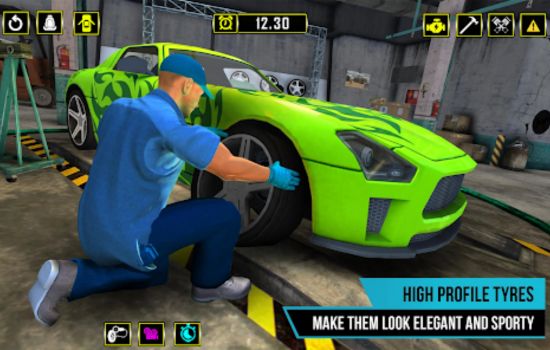There's something magical about the exact moment a silent engine finally comes to life with that satisfying roar that makes your whole body vibrate.
That adrenaline rush when you understand why that system was failing and you manage to fix it with your own hands.
For years, that moment was reserved for professional mechanics or enthusiasts with well-equipped garages and deep pockets. But the digital revolution changed the game completely.
Today, anyone with a smartphone or computer can experience that satisfaction without investing a fortune in tools or risking real vehicles.
Automotive mechanics simulators have democratized this knowledge in ways that seemed impossible just a decade ago.
Car Mechanic Simulator 21
★ 4.4Information on size, installation and warranty may vary as updates are made in official stores.
See also
- Check your vision easily
- The Magic of Push-to-Talk
- Maximize Your Energy, Maximize Your Day
- The Journey to Your Animal Soul
- Everything Under Control from your Mobile
Why Simulators Work Better Than Books
Traditional technical manuals have a fundamental flaw. They attempt to explain dynamic processes with static words and flat images. Your brain has to do a tremendous amount of work translating that abstract information into practical understanding.
Simulators eliminate that gap completely.
You see the engine spinning in real time. You hear when something goes wrong. You observe how each part interacts with the others. Your brain processes this multisensory information naturally and intuitively.
Neuroscience repeatedly confirms this. Kinesthetic learning creates longer-lasting memories than passive reading. When your hands are actively involved, even virtually, information is more deeply ingrained.
Plus, these games let you fail without consequences. Connected that battery incorrectly? You learn your lesson without real explosions. Installed the oil filter incorrectly? The game shows you the mistake without costly damage.
This risk-free practice environment accelerates learning dramatically. You're not afraid to experiment. You constantly try new things. You develop mechanical intuition organically.
Car Mechanic Simulator: The Perfect Virtual Academy
This simulator set the standard for the entire industry.
You put yourself in the shoes of a professional mechanic. Customers come in with problematic vehicles. They describe vague symptoms like "it's making a strange noise" or "it loses power when accelerating." Your job is to figure out exactly what's wrong.
The level of detail is impressive. Each vehicle contains fully functional, complex systems. Engine, transmission, suspension, brakes, electrical systems. Everything is modeled with technical precision.
You can remove individual components and examine them closely. Worn parts show visible wear. Dirty filters are really dirty. Damaged cables have broken insulation.
The difficulty progression is perfectly balanced. You start with basic repairs that any beginner can complete. Changing tires, replacing batteries, adjusting headlights. Simple tasks that build confidence quickly.
Gradually, the challenges become more complex. You diagnose engine timing problems. You repair fuel injection systems. You rebuild entire transmissions. Each new challenge expands your knowledge significantly.
The financial aspect adds valuable realism. You must run your workshop like a real business. You buy parts, pay for tools, and collect payments from customers. You learn not only mechanics but also basic business management.
And sandbox mode offers complete freedom. Experiment without limits on money or time. Modify cars for high performance. Test extreme configurations. Discover what each component does without the pressure of a goal.
My Summer Car: The School of Hard Knocks
This game adopts a completely different philosophy. There are no extensive tutorials or helpful pointers. It throws you into the deep end and says, "Learn to swim."
You start with automotive parts scattered throughout a messy garage. Your mission is to assemble a functional car from scratch. It sounds simple until you actually try it.
Every screw must go in its exact place. Each component has a specific installation order. Forget a critical step and all the previous work is rendered useless.
It's frustrating at first. You spend hours connecting parts that seem right. The engine still won't start. You don't understand why. The frustration grows exponentially.
But that frustration is the most effective teacher possible.
It forces you to think like a true mechanic. There are no shortcuts or easy answers. You must solve problems using logic, patience, and methodical experimentation.
The game also simulates aspects of real life. You need to work to earn money. You buy food and pay bills. You sleep when your character is exhausted. This total immersion creates deeper learning.
The physics are extraordinarily realistic. Set the alignment incorrectly and the car constantly drifts. Underfill the radiator and the engine overheats. Install the wrong parts and performance suffers dramatically.
When that engine finally starts after days of work, the satisfaction transcends the virtual. You didn't just complete a game. You mastered complex mechanical concepts through sheer perseverance.
Garage: Mechanics in Your Pocket
Accessibility is critically important for effective education. Not everyone has access to powerful computers or expensive consoles. Garage recognizes this reality and offers the perfect solution.
This mobile app transforms your smartphone into a portable professional workshop. The interface is specifically optimized for touchscreens. Every gesture feels natural and intuitive.
The game features an impressive variety of vehicles: sedans, sports cars, SUVs, and pickup trucks. Each comes with unique problems requiring specific solutions.
Your job is to diagnose first. You carefully examine symptoms. You use virtual diagnostic tools. You identify faulty components. Then you proceed methodically with the repair.
The educational system is brilliantly integrated. As you play, you learn about different automotive technologies. Turbo engines, CVT transmissions, hybrid systems. Everything is explained in a practical context.
Progression keeps motivation consistently high. You start with a small, limited workshop. You successfully complete jobs and earn resources. You gradually expand your business. You unlock more sophisticated vehicles.
Challenge mode introduces time pressure. You must complete repairs against the clock. This urgency simulates real-world situations where efficiency matters.
And exploration mode allows for stress-free learning. Choose any unlocked vehicle. Disassemble everything freely. Study each component in detail. Learn at your own personal pace.
Portability completely changes the educational game. You learn during work breaks. You practice while commuting on public transportation. You study before bed. These brief moments accumulate substantial knowledge over time.
Myths About Virtual Learning
Many skeptics question the validity of learning mechanics through games. It's worth addressing these concerns directly.
"It's not the same as working on real cars." That's right, but no one claims that. These simulators teach concepts and systems. Physical practice comes later. But entering a real workshop with a solid theoretical understanding accelerates your learning dramatically.
"Games oversimplify." Some do, but the ones mentioned here are surprisingly realistic. They model automotive physics with impressive accuracy. The systems function like their real-life counterparts.
"It's just entertainment with no educational value." The thousands of users who have applied this knowledge to real cars completely refute this. The educational value is undeniable and widely documented.
"You need special talent for mechanics." False. Mechanics is learned through consistent practice. These simulators provide exactly that without financial or logistical barriers.
Developing a Mechanical Mindset
Beyond specific technical knowledge, these games cultivate invaluable ways of thinking.
You learn to approach problems systematically. Expert mechanics don't guess randomly. They follow logical processes of elimination. They methodically test hypotheses. This mental discipline applies to any professional field.
You develop constructive frustration tolerance. Not everything works immediately. Some problems require multiple attempts. This resilience is a huge professional asset.
You develop rigorous attention to detail. A screw that's not properly tightened can cause catastrophic failure. This precision becomes second nature with enough practice.
You improve your technical communication skills. You learn correct automotive terminology. You can clearly explain problems to other professionals. This skill has immense practical value.

Conclusion
The question was never whether you could learn mechanics through simulators. The question was always whether you were willing to try.
You just need genuine curiosity and a commitment to consistent learning.
These simulators won't magically turn you into a professional mechanic. But they will give you a solid foundation for building real-world knowledge. You'll understand complex systems. You'll develop mechanical thinking. You'll gain confidence in your technical abilities.
Some will discover a professional passion. Others will simply want to better understand their own vehicles. Both goals are perfectly valid and achievable.
The automotive world is no longer an exclusive club for insiders. Technology has broken down those walls. Now it's up to you to take advantage of these extraordinary tools.
Your first virtual mechanic challenge awaits. That troublesome engine needs your attention. The tools are ready on your screen.









